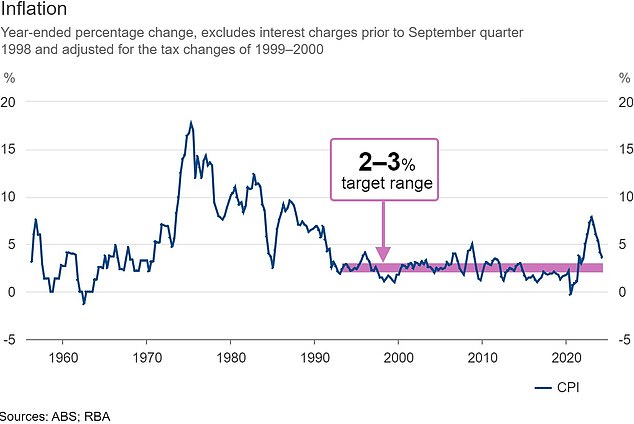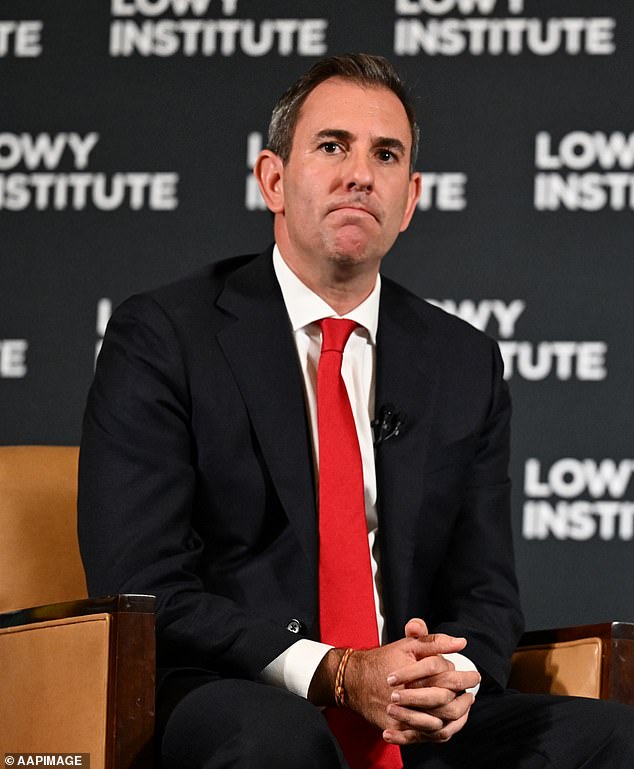Australia has avoided a recession despite the rising cost of living thanks to a sharp rise in immigration, but there are now calls to deliberately trigger a short, sharp recession to avoid a much larger one.
The latest GDP figures show Australia produced only around 2 per cent more in 2023 than in 2022, which is the lowest result since the 1990-91 recession and 2020 border closures, despite population growth from the country.
Rand Low, associate professor of quantitative finance at Bond University, has urged Australians to cut back on discretionary spending – items such as takeaway coffee, online subscriptions or nights out – so that more cash is not pumped into the economy.
The “centerpiece” of Treasurer Jim Chalmers’ federal budget due in two weeks is tax relief due to come into effect in the middle of this year, but Dr Low wants Australians to save that money rather than spend it.
“It is true that if we eat less and buy less ‘stuff’, this will affect the economy and lead to a recession,” he said. news.com.au this week.
“But what we’re looking for is that it may be necessary to have a slight recession for about a year, rather than a ‘deep’ recession that may last several years.”
An academic has urged Australians to steer the country into a short-term recession to avoid a devastating long-term one, just weeks after Jim Chalmers delivers the federal budget.
Inflation remains high despite a series of interest rate increases by the Reserve Bank.
The Consumer Price Index (CPI) stood at 3.6 per cent in March, just outside the RBA’s target band of 2-3 per cent.
Inflation is forecast to remain difficult to control as spending on essential non-discretionary goods, such as rent or mortgages, will remain incredibly high due to the housing crisis.
Commonwealth Bank chief economics Gareth Aird said this week that interest rate cuts expected later this year will likely be delayed until 2025.
Gasoline is also reaching record levels due to the ongoing conflict in the Middle East and Europe, and the Australian exchange rate, which in turn has an effect on grocery bills as supermarkets pay more for supplies by truck to their stores.
Low said unions across Australia have been demanding pay rises to combat the rising cost of living, which would likely cause white-collar workers to also demand similar increases.
“If there is no increase in productivity, any additional increase in wages simply serves to increase the price of goods and services, which is inflation,” he said.

Inflation remains above the RBA’s target band of 2-3 per cent despite interest rate increases.
Dr Low said having a self-induced short, sharp recession could prevent what is known as “stagflation”, or high inflation and high unemployment simultaneously.
In other words, the price of goods and services rises and wages rise to keep pace, but the country does not produce more, weakening the Australian dollar and making the country less competitive on the world stage.
He said if stagflation occurs, Australia would see a recession that would affect the country for years, repeating what happened in the early 1980s and more briefly in the early 1990s.
Dr Low said if the country can remain competitive in the short term, once global tensions ease – in the Middle East, Europe and also around China – then Australia will be able to turn to its main exports such as mining and education, which will boost our economy.
He said emerging industries in the fields of technology and renewable energy could also lead to a new boom for the country if we can avoid a long-term recession.
Treasurer Jim Chalmers says the tax relief, which comes into effect in the middle of this year, will be the centerpiece of his government’s financial support plan.
“And if we can afford to do a little more than that, then those decisions will be made in the next week or two,” Dr Chalmers told reporters in Canberra on Monday.
The treasurer acknowledged the pain Australians were feeling but said any additional support for the cost of living would have to “mitigate inflation rather than increase it”.
Headline inflation has moderated from its peak, but the 4.1 per cent annual rise in the December quarter is still above the target range of two to three per cent.

Dr Low said a short, sharp recession could prevent “stagflation” that could send the country into a years-long recession.
Inflation data for the March quarter will be released on Wednesday and is expected to show a slight quarterly pick-up from the 0.6 per cent recorded through December.
Economists believe it will moderate from the 4.1 percent annual increase recorded in the 12 months through December.
Dr Chalmers said inflation remained the focus in the short term and was one of the reasons his government was still aiming for a surplus in 2023/24.
However, when asked whether the deficits over the next two financial years, as forecast in the mid-year budget update, were appropriate in a high inflation environment, he said the balance of risks was changing.
“And our fiscal strategy will change a little bit with that,” Dr. Chalmers said.
Ahead of the May 14 budget, the treasurer met his G20 counterparts in Washington and said global uncertainty has led the Treasury to review growth expectations for key economies.
China’s growth has slowed by 0.25 percentage points in 2025, to 4.25 percent, according to Treasury forecasts.
The downgrade would mean China’s growth would be the weakest period since the Asian nation opened its economy in the 1970s.
The forecast for the UK economy has also been lowered by 0.5 percentage point to 1.25 per cent in 2025, due to cost of living pressures and a drop in exports following Brexit.
Japan’s growth has been revised to just 0.75 percent in 2024, a drop of 0.25 percentage points after weaker-than-expected consumption.
It is unclear whether these revised forecasts will have implications for the domestic context, and the treasurer indicated that Australia’s updated forecasts will be in the budget.

